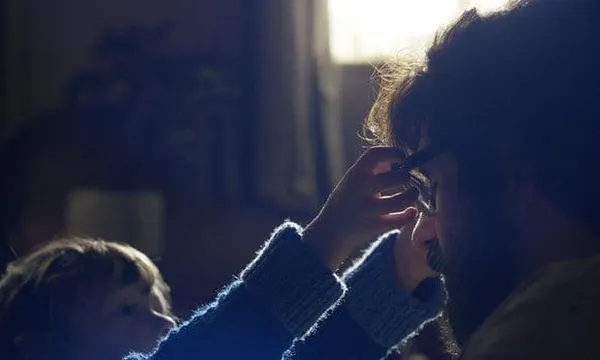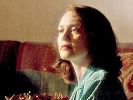Eye For Film >> Movies >> Notes On Blindness (2014) Film Review

Australian theologian and dad-of-five John Hull didn't lose his sight in a moment, it was a gradual dying of the light that lasted for decades. When, in 1983, the last of it departed, he began to keep an audio cassette diary, as he puts it: "I had to think about blindness because if I didn't understand it, it would defeat me." The resulting recordings weren't just a collection of his own thoughts but also a patchwork of family incidents, all in all a three-year experience would lead to his book Touching The Rock.
Debut feature directors Pete Middleton and James Spinney adapt the book using the original recordings themselves, along with interviews with the Hulls, and adopting a similar lip-synch technique to that employed in Cleo Barnard's The Arbor. We see John and Marilyn in moments from this period - or rather we hear them as their words are lip-synched by Dan Skinner and Simone Kirby. The slightly odd sense of dislocation that results is one of many ways that Middleton and Spinney give us a sense of how otherworldly Hull found his blindness initially - still connected to a familiar world but also at an almost imperceptible remove from it.

The pair also use the camera to heighten the sense of lost connection, with those people other than Marilyn, including his own children, generally glimpsed from afar or in such a way that their facial features are obscured, a technique which means that when, in a dream sequence, one face is revealed in full, we get a real sense of the impact it must have had on Hull himself. "Every time I wake up, I lose my sight," he says.
Hull's reflections touch on areas the sighted rarely stop to consider, such as the way that still photos are easier to remember than actual physical moments with loved ones - a memory trick that anyone who has lost someone close will easily relate to - or the importance of smiling, or not. Hull realises, or at least suspects, that he is smiling much less because it is a reciprocal act that he is now performing in what amounts to a vacuum.
Unsurprisingly, Hull's experience of sound is also a crucial aspect of the film, with the filmmakers expanding on ideas they used in their award-winning short of the same name. Particularly beautiful is a sequence in which Hull talks about the experience of rain, the myriad notes it plays on what it hits - "rain brings out the contours of what's around you". Middleton and Spinney explore the concept by capturing rain tumbling on everything from dustbins to trees before bringing the storm into Hull's house as he asks "why can't rain fall inside?".
This is no glossy journey to enlightenment. Hull experiences several existential crises during the film but there's always a sense of a man learning to navigate a world that holds fresh wonders as well as fears and of the importance of the sighted and those with sight loss reaching out to one another not in order simply to 'help' in but to learn from one another.
Reviewed on: 28 Oct 2016
















